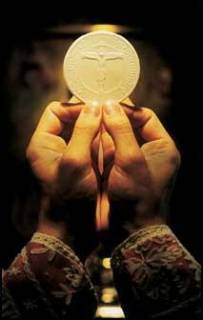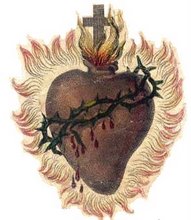Mother Teresa and Housewives: The Road to Holiness Category
This great short article is meant for housewives- you know, those wonderful women who sacrifice 40 hours a week of work outside the home for 120 hours of work a week inside the home- but could be read and used by everyone.
Mother Teresa is a true example, and saint, for our times. Following in the footsteps of the great St. Therese of Lisieux, she teaches that we don't have to do great things to be a great saint, but simply little things, the day-to-day humdrum of life, with great love. I have mentioned before that I never had much love for Dorothy Day after I heard her quoted as saying "Don't call me a saint. I don't want to be dismissed so easily." I thought this was an exercise in vanity, or perhaps pride. But I was wrong. I understand that she was on to something. Often we look at saints as "Super-men", or "Super-women," and think that holiness is something for the select few, those who are given great grace and opportunity to do great things. Not so! The saint is the one who loves greatly in whatever walk of life they find themselves in. The housewife finds her sanctity in the day to day "things" of her life, as does the CEO, the politician, the garbage man, or the priest. We need to focus on the task at hand, and do it with great love for God, and not worry about the rest.
This is obvious in the life of St. Therese, as shown through her "Little Way," and through the life of Blessed Teresa of Calcutta. Love God in the simple moments, in the menial tasks as much as in the great adventures, and you will find your happiness there.
St. Therese and Blessed Mother Teresa, pray for us!
God love you!
************
May 23, 2007
Seventy years ago today, on May 24, 1937, Blessed Mother Teresa made her final profession as a Loretto sister. Like most suburban housewives, I have never been to India. I never witnessed Mother Teresa as she ministered to the world's "poorest of the poor." Like many others, however, I devoured books and articles about this dynamic and simple nun who pulled the dying off Calcutta's streets, and gave dignity to those suffering. She literally helped change the world.
At first glance, an American mother's life seems so unlike the life Blessed Mother Teresa had. She lived amidst poverty. We live in a country full of wealth. She wore a simple sari. Most of us have a closet full of clothes. She chose a consecrated life of poverty, chastity and obedience as a sister. We have vocations as wives and mothers. Our lives seem worlds apart, yet Blessed Mother Teresa's spirituality can be instrumental in teaching us to know how to live our vocation and raise our children well. Here's how.
Mother Teresa teaches us to accept what we get from the hand of God. Biographers tell us that Mother Teresa, whose given name was Agnes, admired St. Therese the Little Flower and her "Little Way" very much, so much that she wanted to take the name 'Therese' upon professing as a sister. However, another postulant also wanted that name and spelling. Quietly, without a fuss, Agnes took the Spanish spelling of the name ('Teresa'), relinquishing the spelling she desired more. In this simple action and attitude, Mother Teresa teaches us to accept what life deals us with calm resolution that God Himself guides all happenings, large or small.
Mother Teresa teaches us there is holiness in doing small things with great love. With a smile on her face she quietly and tenderly cleaned the maggot-filled sores of a dying man, ignoring the stench and fighting the human urge to turn away. She did this again and again and again each day — small things with great love. When I tie my child's shoe patiently or wipe his nose gently, I am doing a small thing with great love. When I serve my husband who has had a difficult day his favorite meal with a smile (even though my own day has been filled with uncooperative children and minor emergencies), I am doing a small thing with great love. When I lead my sick child to the bathroom to throw up for the third time during the night and I clean him and the floor with calm resignation, I am doing a small thing with great love. Life is full of these opportunities. Mother teaches that is the path to holiness.
Mother Teresa teaches us not to fret about the tasks before us. When she was alive she did not wake up in the morning anxious and stressed about the day. She didn't say, "Oh my goodness! I have so much to do! There are so many poor and I can't handle this ...." She simply looked at the task before her, tackled it, and then moved on. We should follow this example in our daily living.
Mother Teresa teaches us it is good to rest. Biographers tell us Mother Teresa took naps. Does this surprise you? There was a point in time when I thought it was a sign of weakness if I laid down to rest during the day or went to bed early. I now see how silly that is. If our bodies are temples of the Holy Spirit, then taking care of those bodies is a serious responsibility. Besides, refreshed, we can accomplish more.
Mother Teresa teaches us that every person has worth and dignity. The annoying soccer coach, the impatient clerk at the store, the grumpy mailman who bypasses my house because he thinks my van is parked too close to the mailbox — these people were made in the image and likeness of God just as much as the friendly parish priest or sweet, elderly grandmother. Sometimes it would be easier to love a beggar dying in the street than the neighbor who growls at my children if a stray ball rolls in their yard. Mother's actions showed we are to respect everyone.
Mother Teresa started her day with prayer, and arranged her day in an orderly way. She had a schedule. When we do this, we prioritize our lives toward God and keep focused.
God's plans for me are different from what they were for Mother Teresa. Mostly likely I will never tend to wounds of people ravaged by disease or scarred emotionally by severe rejection. But as a mother I will daily tend little wounds many times — a scraped knee after a trip to the playground, my child's hurt feelings over rejection from a playmate, the fatigue of my spouse over the daily troubles of work and family living. By remembering Mother Teresa's example and living the spirituality she demonstrated, I can be an instrument of God, bringing peace and healing in my little part of the world.
For more information on Blessed Mother Teresa, visit her website.
Theresa A. Thomas, wife of David, is a homeschooling mother of nine children, a freelance writer and newspaper columnist for Today's Catholic. Look for her contribution in Amazing Grace: Stories for Fathers due from Ascension Press later this year. This article originally appeared in Today's Catholic.






